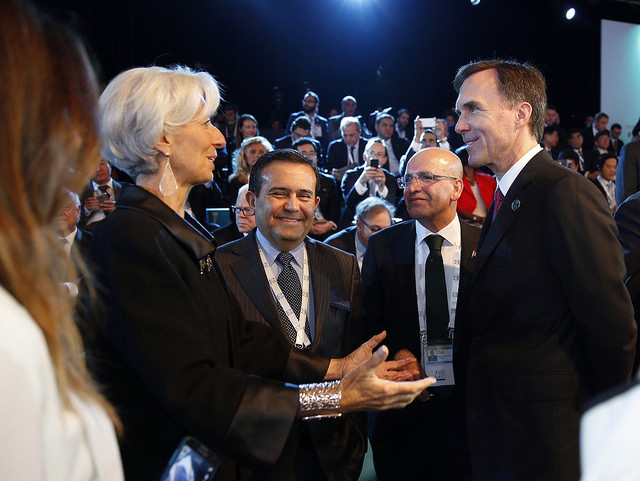Like this article? rabble is reader-supported journalism. Chip in to keep stories like these coming.
For the last five years, the International Monetary Fund (IMF) has consistently been revising downwards its forecasts of world economic growth.
In a slowing global economy, eyes turned to Shanghai where the Group of 20 (G20) finance ministers and central bankers sat down February 26-27 to assess the worsening outlook, and agree on what to do together.
The G20 final communiqué identified a number of issues such as volatile capital movements and sluggish investment; but failed to announce any joint course of action or agree on the policy menu.
Joint action is needed when national policy levers are not available or have been ruled out.
Prior to Shanghai, former Bank of Canada and Bank for International Settlements senior official William White explained that after decades of “easy money” policy, central banks were out of ammunition, and national monetary policies had little to offer a slowing international economy.
Central banks tried zero interest rates, buying securities to flood banks with reserves for lending, and now the European Bank, Switzerland and Denmark have negative interest rate regimes. There is no place to go for central bankers trying anew to ease monetary conditions.
From his arrival in China, German Finance Minister Wolfgang Schäeuble high-handedly ruled out G20 fiscal policy co-ordination — concerted stimulus spending — declaring that the “debt-financed growth model” had reached its limits.
Setting aside the bluster, Schäeuble was saying Germany was not prepared to boost purchases from its EU and world trading partners, despite its strong financial position.
With no flexibility in monetary policy or agreement on joint fiscal policy, G20 countries discussed exchange rates. How are fluctuating currencies expected to affect economic growth?
Several countries, notably Canada, have already allowed their currencies to drop. This passes slow growth on to trading partners, because it diverts spending away from goods and services purchased abroad and towards domestic markets.
Save yourself at the expense of your neighbours is not a policy designed for the common good. It does play well at home — so long as people accept the fall in their standard of living due to the devalued currency.
Host China announced it rejected competitive devaluation of its own currency to improve its trading position. The communiqué called on all countries to avoid pursuing currency depreciation. Presumably Canadian Finance Minister Morneau and Bank Governor Poloz kept their heads down when this part was read out.
The economic outlook for the major economies could be significantly improved. Richer G20 nations need to commit to measures that would address the main cause of the slowdown: debt deflation.
The need to pay interest charges instead of buying goods and services slows the world economy. This debt deflation gets worse as household debt loads increase. When debts cannot be paid, they will not be paid. The G20 needs to agree to a debt jubilee: systematic writing down of debt for the most vulnerable nations. Debts pile up and citizens save to pay interest. Mounting interest payments slow consumption for mortgage holders. Heavily indebted households coping with unemployment and economic dislocation spend as little as possible. Students graduate with loan obligations and little income.
This stream of loan payments diverts money from spending on basic human needs into interest paid to banks.
G20 countries need to work out how to make lenders reduce debts.
For a start, Canada could require its banks to forgive student loans.
Growing inequalities over the past decades have transferred purchasing power from those who spend everything they earn and receive, to the wealthy who sock savings away.
People save and invest more as their income rises. When income exceeds what is needed to maintain even a luxurious standard of living, earners should be paying considerably more in taxes.
Progressive taxation means making ability to pay the principle factor in income tax. It is fairer and works better for more people than current low-tax regimes for higher-income earners where income from wealth is given special treatment, and taxed at a lower rate than wage and salary income.
Taxes from the wealthy can be transferred to lower-income households in the form of social wages. Better pension benefits, tuition-free public education, higher income support, increased minimum wages, and living-wages agreements would improve the standard of living of people who now use credit cards or loans to cover monthly expenses.
In British Columbia, social assistance cheques have not increased in nine years. Not only is this intolerable in a civilized society, it contributes to slower growth in income and employment, like all other inferior social-wage levels.
Canada and most other G20 countries are well placed to undertake major public investments in infrastructure. Contrary to extensive propaganda campaigns in favour of public-private partnerships (or P3s) public investment projects work best when publicly owned and administered.
In a February 26 commentary to a G20 seminar, IMF Managing Director Christine Lagarde pointed out that infrastructure investment has additional potential for growth when economies are weak and employment slack.
The G20 needs to hear about policies that foster economic growth by reducing unemployment, improving access to public services, and increasing lower incomes. Debt relief and forgiveness need to be part of the policy menu. Ignoring debt deflation will not make it go away.
Duncan Cameron is the president of rabble.ca and writes a weekly column on politics and current affairs.
Photo: Prime Minister of Canada/flickr
Like this article? rabble is reader-supported journalism. Chip in to keep stories like these coming.



